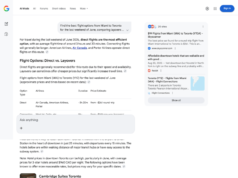It’s too soon to say if the tides are turning in President Trump’s favor in Silicon Valley. However, 100 days into his presidency, there’s a prevailing sense of cautious optimism in the tech community.
“It’s still very early days for the administration and a lot of the pieces of the administration and the key staff are still being put in place, so I think it’s a little early to say,” Victoria Espinel, CEO of the Software Alliance, a trade group comprised of tech giants, including Apple, Microsoft and Salesforce, told NBC News of Trump’s first 100 days.
However, she said, “We have been pleased with the outreach from the administration to the tech industry. [President Trump] has a much better understanding of the software industry now and appreciation that we create a lot of jobs.”


Silicon Valley never wanted to see a President Trump. For every $60 in donations Hillary Clinton received from workers in the tech sector, Trump got $1.
Katie Jacobs Stanton, a technology executive, spearheaded an open letter to then-candidate Trump last year, garnering signatures of more than 100 tech leaders.
After living 100 days with the man they said, if elected, “would be a disaster for innovation,” Stanton said she’s found one thing for which to give Trump credit.
His election “has awakened us,” she said. “How many people in Silicon Valley were actively marching for things before Trump’s arrival? It wasn’t part of our weekend plans.”
A Mobilized Tech Community
When Trump signed an executive order in January banning people from several Muslim majority countries from traveling to the United States, 100 technology companies, including Google, Twitter, Apple and Uber, filed “friend of the court” briefs challenging the order.
“He just signs these executive orders,” Stanton said. “The good news is our democracy is pretty strong and people are fighting back.”
That includes putting their tech skills to work — creating websites, including “Track Trump,” to keep Trump honest on his campaign promises and what he’s actually achieved, and even bots. Resistbot will prompt you to enter your basic information and then deliver your text messages to your representatives, making it as easy as sending a text in order to give Congress a piece of your mind.
Visas for Highly Skilled Foreign Workers
In February, Kalpesh Kapadia, CEO of SelfScore, a company that offers credit to international students in the United States, hosted a dinner for reporters and concerned voices in the tech community to discuss issues that could impact Silicon Valley under President Trump. Chief among them were innovation and H-1B visas for highly skilled foreign workers.
Kapadia, who decades ago was on a student visa and then an H-1B before getting a green card, said he sees “a lot of rhetoric that isn’t translated into action.”
Related: In Silicon Valley, Uncertainty and Scrutiny for President Trump
However, he said he believes Trump’s recent executive order, which instructs the departments of Homeland Security, Justice, Labor, and State to review existing procedures, could be a positive. The 85,000 visas are currently awarded in a random lottery and Kapadia said he wants to see the visas being used for the most highly skilled, high-paying jobs where there’s a need in the tech community.
“There is a shortage of tech workers in things such as computer science, data science, biology, chemistry and math. People have chosen not to study STEM majors in this country,” Kapadia said. “It’s a pipeline issue and it can not be fixed overnight, but companies need to hire to grow.”
Between the review of H-1B visas, the Muslim ban — which has since been overturned — and the constant conversation about “building a wall,” Stanton said Trump’s rhetoric is going against the fabric of what makes America great.
“We see so much great innovation and inspiration coming from a lot of engineers from around the world,” she said. “It’s a competitive issue if we can’t attract the best and the brightest to achieve our goals. It scares a lot of great people away. Why should they take the risk and come to this county?”
Protecting Your Privacy
Privacy, which has been something the tech giants have historically carefully guarded from government meddling, has continued to be a hot button issue and something the tech community is watching carefully with President Trump.
“On the privacy front, I think he is clearly going to the right of the Obama administration. He will, at any day, sacrifice privacy for security,” Kapadia said.
Trump needs to “understand and get smart about things,” he said. “It’s one thing to have a lot of rhetoric, but there are so many nuances that affect the industry.”
Part of that means Trump, a man who is fond of crowds that he already knows will love him back, may need to step outside his comfort zone and meet with companies in Silicon Valley, according to tech leaders NBC News contacted.
Trump’s advisers already include PayPal co-founder Peter Thiel, Tesla CEO Elon Musk, and Ginni Rometty of IBM. While it’s certainly a start, the general consensus is that visiting the tech capital of the world could be the first substantial step to building a bridge with the community.
“There is always room for an open conversation and I do think it would be important to have a reasonable conversation,” Stanton said. “He should come out. I think it would mean a lot to people if he came out – and had a listening tour.”
Your move, President Trump.






